21st Oct 2024
Reading Time: 24 minutes
Updated 23rd April 2024
We could all do with cutting our household expenditure, so we’ve come up with 51 easy ways you can save money in your home. By making these tiny changes in your everyday life, you will notice a big difference. It’s a huge list, but every little saving adds up – even if you choose just a few to start with.
1. Raid the Kitchen for Cleaning Alternatives
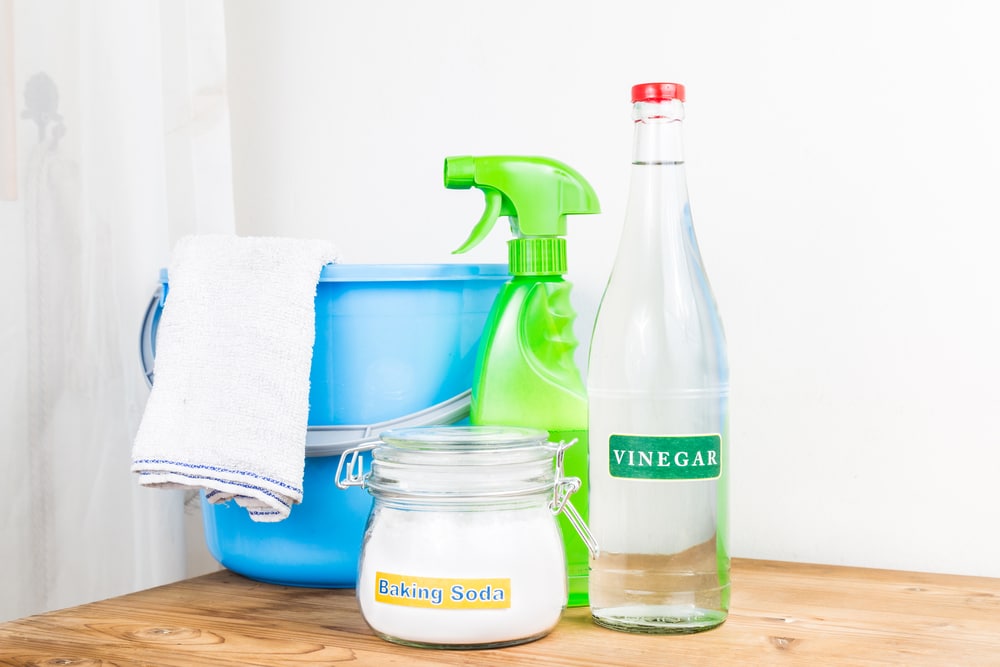
Forking out for ‘miracle’ cleaners that don’t work is a pain. But there’s no need – have a go with an old-style cleaner instead. White vinegar unblocks sinks, removes limescale and cleans your worktops, and it works a charm to clean windows, too. All you need to do is mix it with a bit of water and a few drops of essential oil to mask the smell. If you have pets, make sure the essential oil you choose is safe for them (for example, cats can’t process lavender while dogs can’t handle teatree).
Bicarbonate of soda works on descaling teacups and teapots, gets rid of smells in your fridge and is a great microwave cleaner. For cleaning, just make a paste with a small amount of water, or mix with water and leave to soak for descaling.
2. Cheap Lick of Paint

Save money when sprucing up your house by checking out the ‘oops’ paints at DIY stores. These are paints left over from when the mixer doesn’t quite get the colour right. Some shades are not so nice, but you may find exactly what you’re after for half the price. You may also get lucky and find a really nice shade that is on sale.
If you only need to touch up a few bits here and there, or have a craft project such as turning that bland wooden mirror into something colourful, check out the tester pots. They’re more expensive per litre compared to a large tin, but if you’re only using a small amount it will save you a lot of cash.
3. Do a Mortgage Check
Mortgages have been hot news for the last few years as interest rates have been doing some… interesting things.
It looks like we’re due an interest rate cut in the near future, and if that happens it could be a prime time to remortgage your home if you’re out of your fixed term. Shopping around can save you thousands of pounds, while it could also reduce your overall mortgage term if you’re able to pay more each month than you currently do.
4. Put a Lid On It!
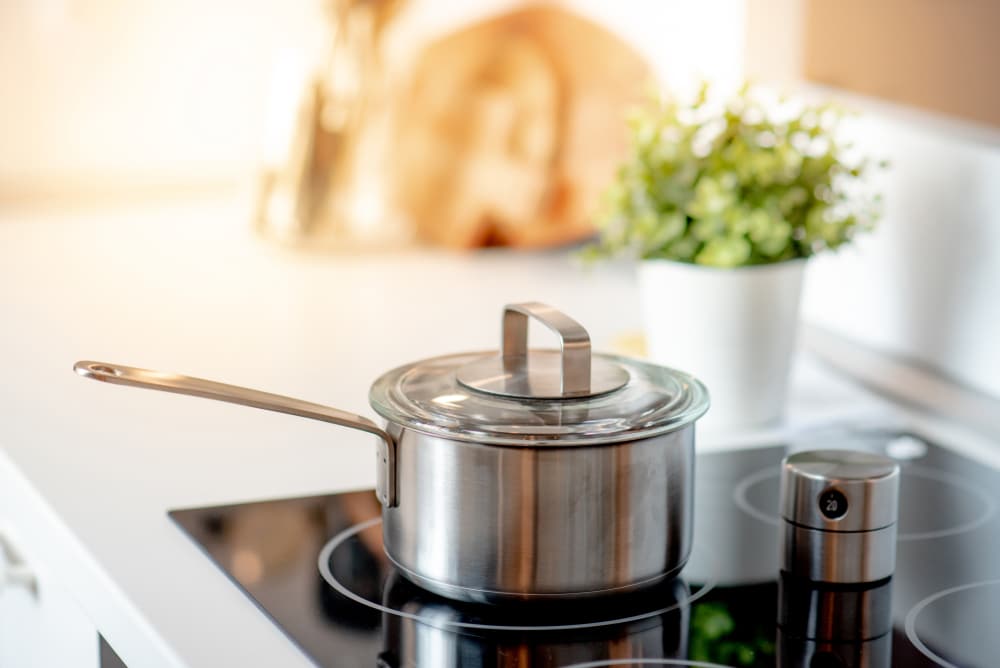
Save energy by always boiling pans with the lid on – it’ll use less energy and heat faster. If you’re an avid cook and want to save more money in the kitchen, consider a pressure cooker, which makes dishes like slow-braised roasts in a fraction of the time.
When it comes to pre-heating the oven, let’s be honest: you don’t always need to if you’re cooking a midweek dinner that’s not served up for guests. If you do pre-heat, don’t leave it for more than ten minutes (ideally five) to save energy.
5. Revive Carpets with Steam Cleaning
If your carpets are looking tired, they can be spruced up with some elbow grease – so don’t race to replace them at a small fortune just yet. Hiring a steam cleaner from somewhere like HSS is easy and costs around £30 a day, depending on where you live. This will give your carpets a serious deep clean and revive the pile.
For very busy families or messy households (usually those with fluffy pets), it could be worth investing in a wet/dry carpet cleaner to keep on hand like the Bissell SpotWash. This can also revive your sofas, mattresses, and soft furnishings, as well as your car interior.
6. DIY It

In an previous version of this article, we suggested taking a local DIY course for around £100 to learn the basics of being handy around the home. But the truth is, you can learn most things you need for free on YouTube and social media these days!
Before you call an expert, do a little online research. That dripping tap can be fixed with a washer, the strange cubby hole can have some custom-built shelves by your fair hand, or your bathroom retiling could revamp an entire room. Whatever you need to do, take some time to look online and learn what you can – it could save you hundreds of pounds. Some things, like electrics, we always recommend using an expert for, of course. But if you want to try and fix that wobbly stair bannister before calling a carpenter, look to YouTube.
7. Make a Shopping List
Some of us like to collect things, others have a penchant for fashion. Some love shiny jewellery, yet more can’t walk past a craft shop without picking up ‘supplies’.
When you go into the town centre, or the grocery store, make a list and stick to it. Only buy what you need – and if you pick up what seems to be ‘a bargain’, think long and hard whether you want this unplanned purchase. Do you really need it? Do you already have something like it? Will you use it? These questions will help you curb your spending at a time when costs seem to be rising rocket-fast.
8. Make Your Savings Earn Maximum Interest

If you’ve held onto the same savings account for more than a year, it’s time to shop around. There are lots of different types, and it is often worth opening more than one if you have some spare cash to set aside.
Regular savers limit how much you can pay in each month – usually around £200 or £250 – but have a high interest rate. These are great for building an easy-access rainy day fund. They’re usually only available to people who hold a current account at the same bank – which means you can also often set up ’round up’ savings. This is when your bank rounds up everything you spend to the nearest pound (or £5 for some, if you choose). For example, if you purchase something at £4.50, this is rounded to £5 with the 50p moved into a savings account. It’s an easy way to save without realising it.
ISAs have limits (an annual pay in limit of £20,000) but they’re wonderfully tax-free – so you don’t pay any tax on the interest earned. There are several different types of ISA (Cash, Lifetime, Stocks and Shares, IFISA) and you can have more than one – but the £20,000 limit is across all of your ISAs each year, rather than for each account.
A fixed term savings account locks your money away for a period of time but has a much higher interest rate. So, if you can afford to lock up some of your savings for the future, consider one of these.
If saving feels impossible as you’re on a low income and Universal Credit, find out if you’re eligible for the Government’s Help to Save account – which could net you up to £1200 FREE over four years.
9. Re-use Old Clothes

Make old jeans into draught excluders by cutting the legs off, stuffing them (try newspaper, magazines, or old plastic bags) and then sewing up the ends. You could re-use baby trousers by turning them into shorts for slightly older kids, or use odd socks for puppet making or stuffing to make dog toys. Tights are great for making cress heads, storing onions and bulbs, packing together to make abrasive cleaner for your sink or wrapping around ordinary coat hangers to pad them out.
Learn how to make do and mend – a smart bit of embroidery or an iron-on patch can work wonders for covering the stain on your favourite top you can’t bear to get rid of!
10. Make a Budget

Take control of your spending by sticking to a budget. Make a list of everything you spend in a week and weed out all the little extras you don’t need. Total up the costs of things you really have to buy, and this is your budget. Make sure you can afford this budget and keep a little left over if possible.
If you don’t have enough money for this budget, then more things need to go. Do you really need to buy lunch at work? Can you live without that Spotify subscription? Make your budget realistic and then stick to it. This should leave you with a little extra every month. You can use this to pay off loans, or make more money by putting it into a savings account.
11. Refuse to Buy Until You Run Out

Go on, admit it: you’ve got half-empty shampoo bottles, a freezer drawer with forgotten leftovers, and at least three opened ketchup bottles in the fridge. We throw out so much food and household waste each year, when making sure we maximise our usage first could save you a significant chunk of cash.
Make a rule: items must have run out (or have one use left, for commonly-used items like washing up liquid or laundry tablets) before you replace them. Keep a list on the kitchen fridge or somewhere easy to see, and write down whenever you throw away an empty container.
This will help you control your spending and minimise overall household waste.
12. Claim Benefits You’re Entitled To
Alright, we’ve snuck this one in because it’s not so much a way to save money in your home as it is a way to ensure you’re getting all you’re entitled to, to boost your income. With recent changes to things like Child Benefit and Child Tax Credit, your household could be entitled to receiving some financial support – even if you previously weren’t.
Use an online benefits calculator such as EntitledTo or Turn2Us to find out if you could claim financial support.
13. Spend Time to Shop Around
Whether you’re renewing your car insurance, house insurance, or broadband, don’t let autorenew catch you out. Make a note in your calendar for EVERY contract renewal (yes, every one) and set a reminder for three days before (or thirty-two days, if your contract has a thirty-day notice period).
Take some time to compare prices online and shop around for deals. Even if you like the current service you’re receiving, getting a cheaper quote elsewhere gives you a bargaining chip to renegotiate with your supplier for a reduced price.
14. Batch Cook
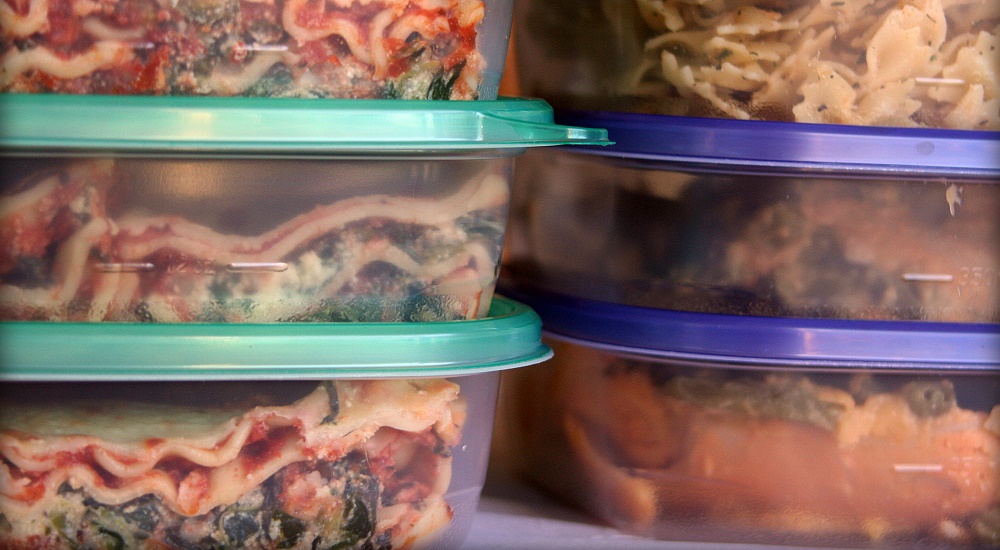
Buying in bulk is a great way to save money – so if you see a BOGOF offer on a household staple like chicken, beef mince, or your favourite veggies, stock up.
Cooking several extra portions in advance and freezing them not only saves you money because you’re only cooking the meal once and you’ve saved on discounted food, it also stops you from reaching for Deliveroo on a night you just can’t be bothered to cook. Replacing one takeaway night each week with a prepped freezer meal could save you around £50 a week – or £2,600 a year.
15. Renegotiate Your Mobile Phone Plan
If you’re out of contract, it’s time to shop around. And now, many providers will let you renegotiate while you’re still in contract, too! Mobile phone providers are clamouring to keep your business, so make sure you contact them to see if you can nab a better deal. If you have a partner or children on the same network, you might also be able to benefit by bundling these together – even better if your broadband could do with upgrading, too.
16. Don’t Pay for Entertainment
Ditch your Sky contract and opt for streaming. Make the most of free trials with a rotating savvy trick: rotate through streamers like Netflix, Apple, and Amazon Prime each month so you’re only using one or two at a time, and set up the free trial. Make a note for when the trial ends!
When you next want to use the service, set up a free trial with a new email address. You sometimes need to use a new payment card, too – but if you’re rotating services each month, this means you could get a year of free entertainment before you’ve run out of payment cards to link to each new account!
If you’re an audiophile, check out Spotify’s family plans – it could save you a fortune, as could Apple Plus (which includes every Apple service for a single fee each month).
17. Make Your Home Energy Efficient

Losing heat and electricity is like throwing money away. According to the Energy Saving Trust, the average household loses around 50% of the heat generated from inside it. So, you’re paying for power you’re not even getting the benefit from. There are easy ways to fix this:
Block draughts
A whopping 20% of the heat lost is through draughts and poor ventilation. So, even small insulating measures like draught-excluders, or thicker curtains, can really make a difference.
Turn your heating down
It’s hard to do it when it’s chilly, but turning the thermostat down a few degrees can save loads of money. According to the Energy Saving Trust, a reduction of just one degree can reduce bills by as much as 10%. It’s clearly worth it. So grab a big woolly jumper and socks, and turn down that thermostat – even if it’s only by one degree.
Switch everything off
We spend £1 billion every year on powering our electrical appliances whilst they are on standby. It’s so easy just to turn them off at the mains and save money.
18. Save Your Hot Water!
The average bath uses about twice as much hot water as a five-minute shower. That means it takes twice as much energy to heat the water. We know five minutes isn’t much, but if you’re having a bath every day, then swapping some for a few five-minute showers will really reduce your energy bills. (Now add that up for a family of four or more and it’s easy to see how quickly you can save!). If you must have a bath, don’t let the water go down the plughole – reuse it for indoor plants or your garden to save water.
You can also save money in your home by only boiling enough water for what you need – 67% of us boil too much, so save energy and only heat as much water as you need.
19. Go for Own Brands

Own brands are the key to big household savings. You might be attached to your favourite names, but own brands are cheaper. They are also often really good quality. If you aren’t sure, just try them out. We’re not just talking food either – own brand cosmetics and medication are cheaper, too. A pack of Nurofen will set you back around £3, but the same ibuprofen costs as little as 16p when it’s own brand.
20. Sort Your Insurance
You should always be checking to see if you can get a better deal on your insurance. With road tax on the rise, reducing your car insurance costs are a must. Lots of companies are also offering 12 months home insurance for the price of nine, or 25% off when you buy online. Click here to compare home insurance premiums.
It’s also worth considering whether you even need some of your insurance policies – you might accidentally be doubling up. Some paid-for bank accounts offer insurance as a perk, for example, while your home insurance could cover your mobile phone when it’s out of the house. Check the small print and work out which insurance packages overlap, and which are the cheapest to keep.
21. Ditch the Tumble Dryer
Tumble dryers are one of the most power-hungry appliances in the home. They use twice as much power to dry your clothes as washing machines do to wash them. According to the Energy Saving Trust, only 35% of us have a tumble dryer. Those who don’t are already ahead in the energy saving race. Those who do can save easily by ditching the tumble dryer altogether. If you are really attached, try spin-drying your clothes before putting them in the tumble dryer. This way they won’t take as long to dry. You can also dry your clothes outside or on a heated airer, and then just finish them off in the tumble dryer.
If you can’t give up the dryer, make sure you keep your dryer’s lint screen clean and its outside exhaust free of obstructions. Clean the lint screen after each load of laundry and check the exhaust regularly. A lint screen in need of cleaning and a clogged exhaust can lengthen drying time and increase the amount of energy used.
22. Get Supermarket Savvy

Keeping your wits about you when shopping can save you money. Look at the price per unit (usually per grams or kgs) to compare prices. Buying in bulk often means you get more for your money. Buying own-brand food is also cheaper.
If you are reluctant, try it at least once. You’ll probably find own brands are equally as good. Trolley will do all the price comparison work for you. Go online and choose from Asda, Tesco, Sainsbury’s or Waitrose. Then select items from your list as normal. Once you’ve totalled everything up, the website will tell you what items you can swap to save money. It will also tell you how cheap you can get your shop at the other supermarkets. If one is cheaper, then consider switching and saving money.
There are also lots of membership cards and loyalty schemes that help you make the most of your shopping – from the Lidl Plus card that gives you 10% off a shop for every £250 cumulatively spent in store, to Tesco Clubcard and Morrisons’ More Card special offer prices for members. They are free to join and hold a card, but could save you a pretty penny every time you top up the pantry.
23. Plan Your Weekly Menu

Meal planning can help you make the most of ingredients, avoiding food waste and reducing your grocery bill each week. It also allows you to buy in bulk, which adds to your savings. For example, if you know you want chicken fajitas on Monday and a curry on Tuesday, a large pack of chicken will be cheaper per gram than buying smaller packs for each meal. You can freeze leftovers, too, which helps cut down on future shopping bills.
Before you go to the shops, check your cupboards, fridge, and freezer. It’s often easy to buy multiples of things you already have at home – common culprits are things like ketchup and other condiments, which you don’t use all the time and might think you haven’t got in stock. Looking at what you already have helps you meal plan as you can see what needs to be used up and you can get creative with your menu that way, too! Sites like SuperCook let you submit the ingredients you already have in the cupboard to find out what meals they’ll make – and if you’re off to the shops, add a few ingredients you want to buy and you’ve got a zero-waste approach to groceries!
24. Use Your Computer as a TV

Gone are the days we all sit around the single TV in the house for the evening. We’re surrounded by screens all the time – so if you want to watch something in your bedroom but only have a TV in the living room, don’t think about buying a new TV for the second room. Instead, use your laptop, tablet, or even phone to watch something.
Alternatively, you could buy a portable projector for around £70 – much cheaper than a television, and they come with an operating system that lets you download your favourite streaming apps like Netflix, Prime, and Disney Plus. They’re pocket-sized, often have built-in speakers and connect to external speakers with Bluetooth, and can give you a massive screen anywhere!
25. Buy Seasonal Fruit and Veg
It’s no longer trendy to eat peaches in the middle of winter. It’s bad for the environment to ship them here from hotter destinations. Plus it means they cost more. Try buying seasonally – root vegetables like carrots and swede are winter vegetables grown in the UK, while spring and summer bring you amazing greens like asparagus, lettuces, marrow, new potatoes, beetroot and raspberries. The National Trust has a great guide to seasonal eating in the UK.
26. Winter Woolies

Wearing your winter woollies indoors can save you money in your home. The human body gives off heat at about 390 BTUs (British Thermal Units) per hour for a man and around 330 BTUs for a woman. Wearing closely-woven fabrics can help you retain an extra half degree in warmth, and a light long-sleeved sweater is another two degrees. Go for a big woolly jumper or hoody and you can gain up to 3.7 degrees more.
What this all means is that you can turn the thermostat down and save money. So don’t walk around your house in a T-shirt and shorts in the winter if you need to turn up the heat to do it. Layer up just a bit so you can turn the heat down.
27. Clear Out Your Junk
You could have hundreds of pounds’ worth of unused stuff lying around in your house. All you’ve got to do is gather up all the old junk that you don’t need and sell it off at a car boot sale. You might have a secret goldmine in the form of vintage vinyl or collectible toys, but even if you just want to get rid of last year’s wardrobe apps like Vinted help you sell them to make some money and make sure they get a new lease of life elsewhere.
28. Grow Your Own

With food prices seemingly on a constant rising trend, and reports of a risk of food shortages in the future, growing your own is one way to help improve your finances, eat nutritious seasonal food, and have some food security. However, we realise most people don’t have massive gardens or allotments to plant, or even tons of time to turn their fingers green.
The good news is there are lots of things you can do even with a windowsill in an apartment (you can grow an entire herb garden on one shelf!). For balcony space, ideal small-area growers are potatoes, tomatoes, leaves like lettuce and Swiss Chard, beetroots, and carrots. There are some ingenious space-saving planters available these days, which let you use vertical space for planting, so check out your local garden centre to get inspired!
Read our article on growing your own veg for more tips.
29. Thrift It
According to Oxfam, its 2019 Christmas sales were the best for eight years. Loads of clever clogs are already rooting around for bargains in charity shops, so get in on the game. The best places to shop are in affluent areas. You’ve got a better chance of getting good quality picks where people have enough money to throw them away. You can get clothes, toys, books and music from charity shops. It takes a bit of effort, but don’t be put off. Plus, buying from charity shops means your money is helping someone else. Get the real finds by making friends with the staff and persuading them to give you a call when any good stuff comes in.
Charity shops are also fantastic for starting a new hobby – you can often find an absolute steal on used equipment, which is great for trying out before you know whether you like something enough to splurge. For example, you are almost guaranteed to find a yarn corner in your local charity shop, complete with knitting needles and crochet hooks, for just a few pounds – ideal if you want to start knitting but don’t want to splash out just yet.
If you need new furniture, most areas will have a warehouse-style shop, either for a larger charity or your local hospice charity. There, you’ll find all kinds of furniture – which is all up to fire safety standards, too – at a fraction of the price.
30. Ditch Bottled Water

Some bottled water is more expensive per litre than petrol. If you could get free petrol, would you continue to spend so much on it? We didn’t think so!
Keep a jug in the fridge if you like cold water, and refill from the tap. It’s not only more cost effective, but it is much better for the environment – a win-win situation.
31. Use the Dregs
Don’t throw away a ketchup bottle with the dregs left in the bottom. Save money by draining it into the new bottle. This works for most condiments and it can be a bit of fun for the kids to get the bottles balancing. You can also re-use sunflower oil for deep frying. Just drain it into a jar using a funnel and a piece of kitchen towel for a filter. This will clear out everything that isn’t oil.
Other handy saving tips are to snap dishwasher tablets in half, water down beauty products, mix value products with more expensive stuff, turn stale bread into breadcrumbs and use scissors for cutting open old toothpaste tubes so you get everything out.
32. Do Your Sums on Supermarket Offers

Usually we tell you to be wary of supermarket offers. But there is a strategy to making them work for you.
First: only buy something that is already on your grocery list. The exception here is if you see a fantastic bargain on a household product you would usually buy, but haven’t put on your list as it hasn’t run out yet. Things like cat litter, kitchen roll, toilet paper, bleach and cleaning supplies, bin bags, and laundry detergent won’t go out of date but could save you a pretty penny if you snap them up on a bargain.
Check the labels on the shelf, too. Something might look like a good price, but look for the price per kilo, litre, or gram, and compare to other labels. A packet of something may seem like the cheapest option – but you might be better off getting the larger packet at a smaller cost per kilo if it is an ingredient you use a lot.
Definitely make the most of the newer supermarket loyalty schemes, too. They’re free to sign up to, but the new trend is to offer ‘loyalty only’ prices, which can be up to half price on some top label items. You’ll also get vouchers, bonus rewards, or even in-store credit on your spending, saving you money in the future.
33. Use Your Local Library
Libraries are the unsung heroes of our local communities. Sadly, many have closed in recent years – but the ones that are still around are a fantastic resource for saving money. If you can’t walk past a bookshop without ‘just going to browse’ and coming out with three books and £30 less in your pocket, try the library! You can also borrow eBooks, CDs, DVDs, and some even have board games you can borrow. Find your local library here.
34. Say No to Packaging

Items that are pre-packaged are often more expensive. This is because you have to pay, not just for the packaging but for the person who put it in the packet. Buying loose is cheaper and produces a lot less waste. You can also choose exactly how many items you want, rather than paying for items you don’t need.
35. Don’t Gamble
Gambling might make you think of casinos or betting shops, but it includes scratchcards and a weekly flutter on the lottery. You are more likely to be struck by lightning than you are to win the lottery. It’s better to put that weekly couple of pounds into a high-interest savings account and make it your Christmas shopping budget.
36. Drink Less Alcohol
With the average cost of a pint now over a fiver, that Friday night after-work drink (that usually turns into more than a few) is looking like a costly weekly expense. Have you added up how much you spend on alcohol each week lately? You might be surprised. A bottle of wine with a meal out can easily be £15 or more, while a spirit and mixer is over £8 in most establishments. If you go out to drink twice a week but stay moderate – let’s say you have two pints on a midweek date night and three pints on a Saturday afternoon at the pub – that’s at least £25 a week (or £100 a month) just on alcohol.
And that’s before you consider what you buy for home, too. If you regularly have wine or beer in the house to have a glass with dinner most nights, you’re easily adding £30 a week to your grocery shop (or £120 a month). Add that to your going-out alcohol budget and it’s easy to see how savings can be made.
We’re not saying go sober! (Unless you feel you need to, of course). But cutting back on a few drinks a week could save you at least £50 a month (that’s £600 a year).
37. Make Your Own Fun

There are loads of ways to entertain the kids and save money in your home. Recycle old paper by letting them draw and make collages on the other side. Make anything you can out of leftover packaging. Add a little glue and paint to some cut-up cereal boxes and they can create some great 3D pictures. Make your own ice lollies and sweet treats. It’s fun and a lot cheaper than buying them in the supermarket!
38. Don’t Spend More for the Garden
Almost everything you need for the garden can be made from household products and waste. Don’t buy new garden pots – re-use old colanders, teapots, or even old terracotta chimneys. Great compost can be made from vegetable leftovers. You can also make your own weedkillers from washing up liquid, water and vinegar.
Check out your local neighbourhood groups like NextDoor, FreeCycle, and Facebook community groups, too. Very often you’ll be able to nab free soil, rocks (great for drainage) or even old pallets to make garden furniture and troughs from.
39. Reduce Laundry Drying Time
Your washer probably has an ‘extra spin’ function. Use it! It is usually around ten minutes long, but it’ll significantly cut the time required to dry your clothes after. All it does is use the spinning action of the drum to draw water out of the clothes, so they come out much drier. Some fabrics even come out almost entirely dry!
You can also use a portable dehumidifier (around £30) to reduce moisture in the air and help clothes dry faster. Did you know it also doesn’t have to be a sunny day for your clothes to dry quickly outside? As long as it isn’t raining or below freezing, your clothes will benefit from being hung out to dry if you have outside space.
40. No Half Empty Runs
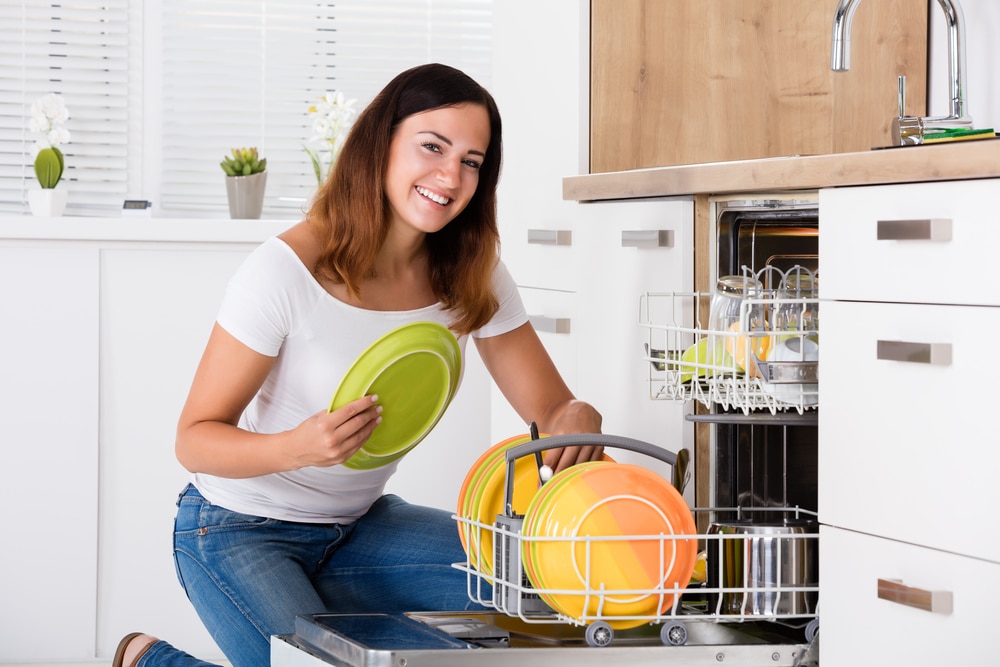
We know you’re not supposed to overfill them, but running washing machines and dishwashers half-empty defeats the purpose. Both dishwashers and washing machines use the same amount of water and heat, no matter how full they are. Get your money’s worth by filling them up as much as you can before they are overfull and won’t work properly. This will save money in your home, and it’s better for the planet.
41. Use Supermarket Schemes
You’ve got to get the most out of your shopping loyalty points, offered by the likes of Tesco (Clubcard) and Sainsbury’s (Nectar). But before you get the most out of them, you’ve got to get them. Sign up for the card your supermarket offers and start earning points to save money in your home ASAP. Even Lidl has a loyalty scheme these days – you’re missing out by not being signed up to them all! If you don’t want to give out your personal details, create a new email address just for things like this and check it periodically.
42. Buy in Bulk
Save money in your home by buying toilet paper, detergent and other household items in bulk from a wholesale supermarket, or from your regular supermarket when there is a special offer. Try specialist stores for cheaper prices.
Find out if you could benefit from a wholesale membership such as Costco. Remember: only buy the things you need and not the things that grab your attention as you walk around! It is easy to get distracted by the many bargains on offer, but it’s not really a bargain if you weren’t planning to buy it in the first place. If you don’t have a membership card, or only need it just for a big event (like in the run up to Christmas), ask around your family and friends to see if they’ll take you for a visit.
43. Keep Your Freezer Stocked
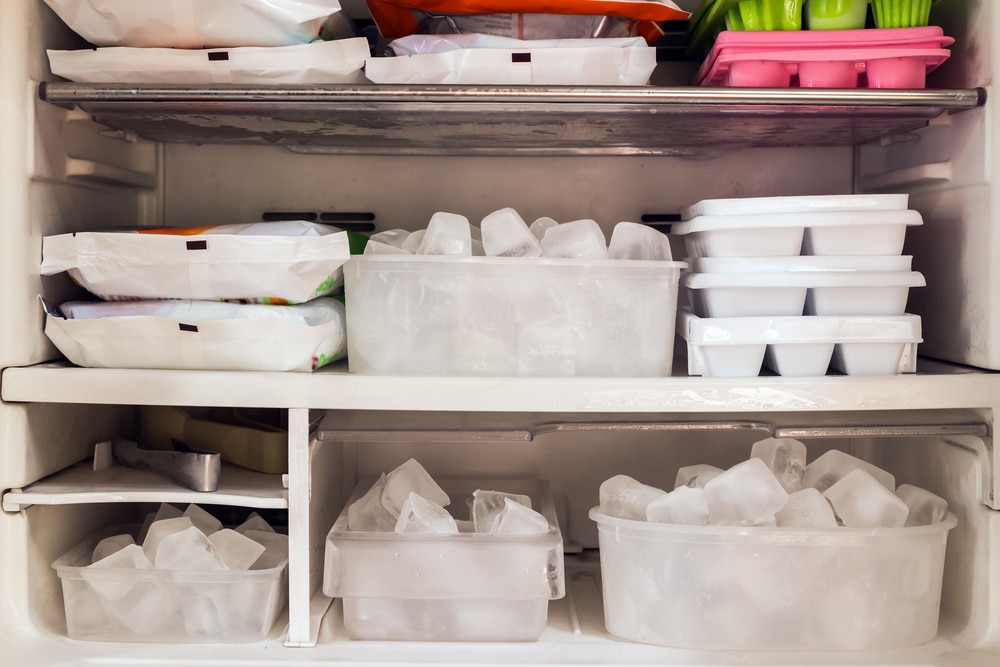
Freezers work far more efficiently when they are frost free and full up. Defrost your freezer, and while you’re at it, check what you’ve already got in stock!
Keep your drawers full even if you don’t have food in there, to make it run as efficiently as possible. Use ice cube trays to fill the spaces (and get creative – fill some with stock, pancake batter, or even slices of lemon to use in your cooking and drinks). Any ice-proof vessel will do to fill the space too, even old takeaway tubs or Ziplock bags filled with water. You can take them out to make space for food and reuse them again later.
44. Don’t Shell Out for New Furniture
Give old chests of drawers and wardrobes a new look instead of replacing them. All you need is a lick of paint and a new inexpensive handle. They will really change the look of your furniture without changing the look of your bank account for the worse.
You can do this with most household furniture – and if you really need something, check out apps like FreeCycle to see if anyone is giving something away for free. You could even make a decent side hustle out of flipping furniture if you discover a hidden talent for upcycling old furniture!
45. Go Electronic
Direct Debits and electronic statements can save you money. Paper bills now incur extra charges from some services. Mobile phones are a prime example, with companies charging up to £3 more for a paper itemised bill. These bills are often available online free of charge. So if you really need one on paper, you can just print it off.
The same goes for Direct Debits. This is because the process of sending you a letter to request payment and then waiting for it costs them money. Payments can always be queried, even after they’ve been paid. So embrace the Direct Debit and save some cash.
46. Never Throw Fabric or Towels Away
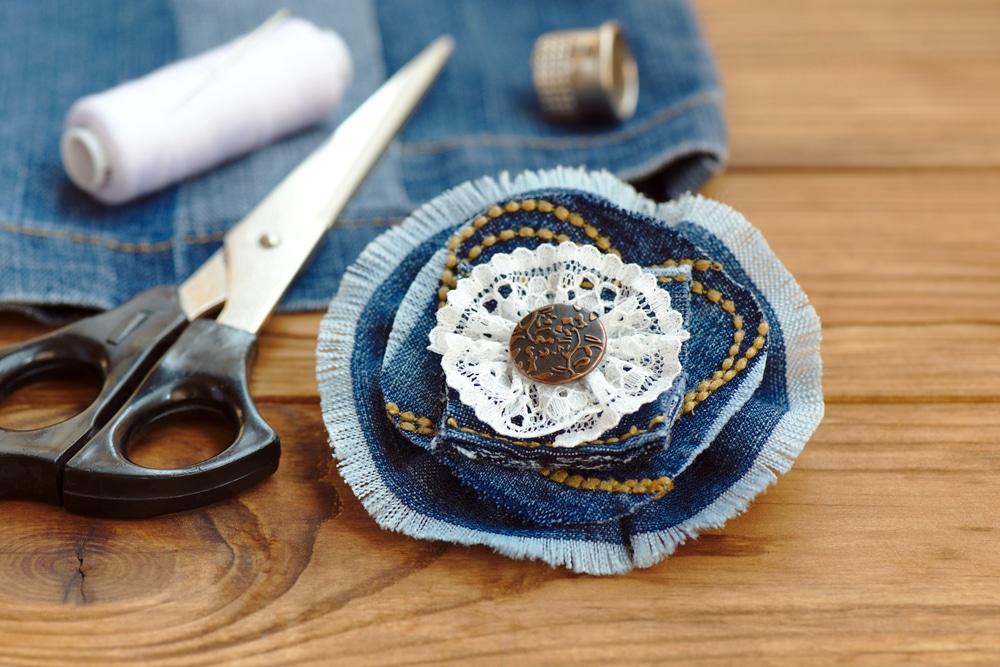
Fabric and towels are some of the easiest things to recycle. Old curtains can be made into seat and cushion covers, table cloths, new clothes and even just tea towels and cleaning rags. All you need for new upholstery is a good staple gun and for the rest, a sewing machine or some time for hand sewing.
If your towels are going a bit grey, bring them back to life by dyeing them a new colour. Thinner towels are great for drying hair or taking to the swimming pool when you don’t have much room in your bag. You can also use them for stuffing draught excluders or making toys for your pets to play with. The possibilities to save money in your home are endless, and all free!
47. Check Your Council Tax Band
When the council tax system was put in place in the early 1990s, houses were put into bands from A-H according to their value. The valuations were done in 1991 and so are not necessarily accurate. Your house could have been worth more then than it is now, especially considering the drop in house prices. This could mean you are paying more than you should be. To check if you are paying too much, see what your neighbours are paying at GOV.UK.
48. Less Dust, More Heat
Make sure you bust the dust on your radiator surfaces. Dust and grime seriously impede the flow of heat in your house. So make sure there is no dirt on your radiators so you don’t spend more money than is necessary heating your home.
While you’re in cleaning mode, make sure you empty the filter on your tumble dryer! You should do this regularly anyway, as it can be a fire hazard, but cleaning the lint out will help your dryer run efficiently.
49. Get Rid of Ready Meals
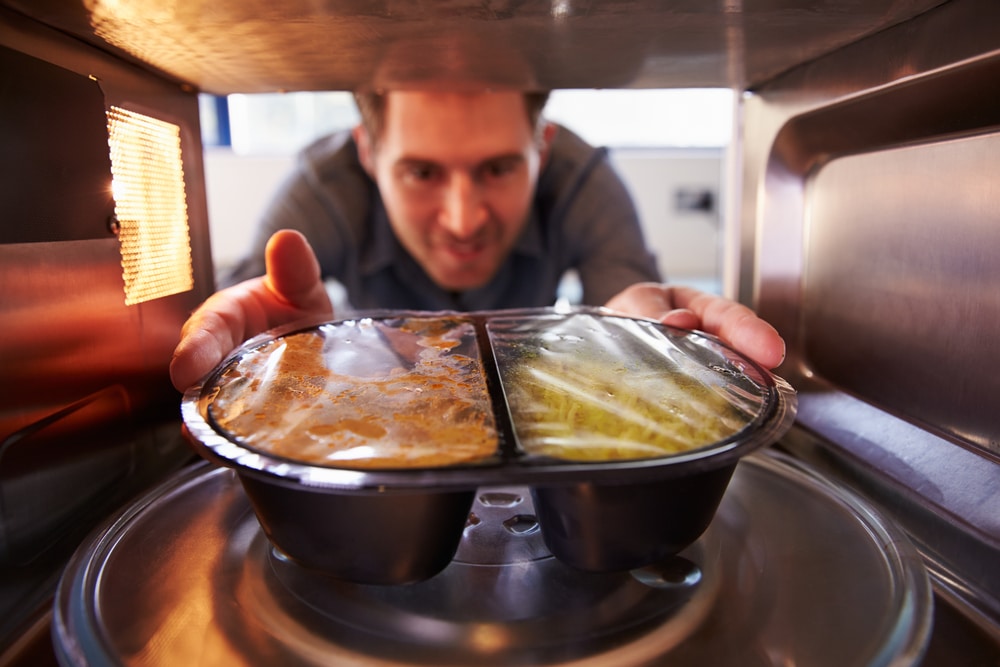
Even if you think you can’t cook, there’s no excuses for ready meals if you’re trying to save money. They’ve got extra additives and preservatives in compared to a homecooked meal. Plus they are far more expensive than it would be to make the same dish yourself. Life doesn’t always give you time to cook, but if you can cook from scratch three times a week and make double, you’ll still be able to have the convenience of microwave meals the other days – just healthy, low sodium, homecooked dinners instead!
50. Keep Track of Your Finances
Always check your receipts, bank statements and bills. You never know who has got hold of your details, so you need to keep tabs on what is going out and coming in. This way if anything is amiss, you’ll be on it like a flash, saving time and money in your home. And of course, always read the small print!
You might be surprised to find old Direct Debits going out for things you don’t use anymore – magazine subscriptions, streaming services, even gym membership. Set up text alerts for your credit and debit cards, so that every time you make a purchase you get a text. It will help you spot possible places to save – and stop fraud in its tracks if you see a transaction you don’t recognise, too.
51. Use Your Oven Less
Ovens use a considerable amount of energy per year, especially if you’re using the oven to cook for a single person. Instead of heating up a full oven why not try using a microwave oven? They are smaller and take less time to cook than regular ovens. There are also other options available such as air fryers and slow cookers. Air fryers have become so popular in recent years, even Jamie Oliver has a cooking show dedicated to them!


